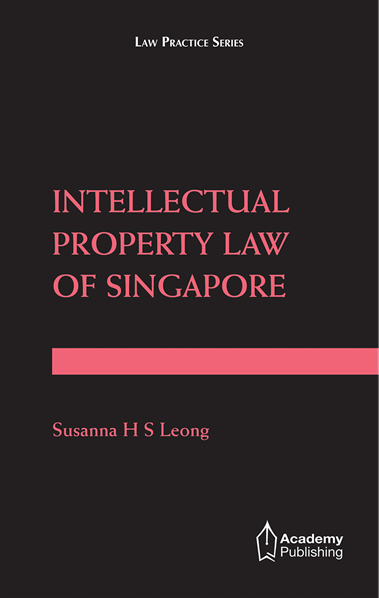This book centres on the discussion of intellectual property law in Singapore. The chapters are categorised into six Parts: Introduction; Copyright; Patents, Innovation and Inventions; Designs; Trade Marks, Passing Off and Unfair Competition; and Confidential Information. Each Part is written with the objective that it may be studied on its own. However, as there may be overlapping rights between the categories, cross-referencing between Parts and chapters is necessary. Singapore’s intellectual property law, like that in many other countries, is intricately bound to a larger set of international legal norms and standards. Therefore, the study of this branch of the law is not complete without consideration of the historical perspectives as well as the influences of international treaties and conventions in the different categories of intellectual property.
In this book, references are made to the legal positions in several jurisdictions around the world, such as the UK, the European Union, the US, Canada, Australia and New Zealand, with a view to: (a) providing comparisons between the law in Singapore and the others; (b) offering possible or alternative interpretations in areas where the law in Singapore is unsettled; and (c) providing an indication of evolving legal trends in the area and the challenges they may bring to policymakers.
Contents
Part I Introduction
Chapter 1 Introduction and General Themes in Intellectual Property
Part II Copyright
Chapter 2 Introduction to Copyright
Chapter 3 Historical Origins and Current State of Copyright Laws
Chapter 4 Copyright in Works and Subject Matter Other than Works
Chapter 5 Copyright in Works and Other Subject Matter – A Closed List?
Chapter 6 Authorship and Ownership
Chapter 7 Duration of Copyright Protection
Chapter 8 Exclusive Rights and Copyright Infringement
Chapter 9 Defences to Copyright Infringement
Chapter 10 Remedies for Infringement of Copyright
Chapter 11 Dealings in Copyright
Chapter 12 Moral Rights
Chapter 13 Rights in Performances and Performers’ Protection
Chapter 14 Copyright in the Digital Age
Part III Patents, Innovation and Inventions
Chapter 15 Introduction to Patents
Chapter 16 Grant of a Patent
Chapter 17 Patent Term
Chapter 18 Scope of a Patent
Chapter 19 Exclusive Rights and Patent Infringement
Chapter 20 Defences
Chapter 21 Entitlement
Chapter 22 Proprietary Rights and Dealings in Patents
Chapter 23 Remedies for Patent Infringement
Chapter 24 Protection of Plant Varieties in Singapore
Part IV Designs
Chapter 25 Industrial Designs
Chapter 26 Integrated Circuits Designs
Part V Trade Marks, Passing Off and Unfair Competition
Chapter 27 Trade Marks: History and Background
Chapter 28 Registrability of Trade Marks
Chapter 29 Exclusive Rights and Trade Mark Protection
Chapter 30 Well-known Marks
Chapter 31 Cancellation, Revocation and Invalidity
Chapter 32 Registered Trade Marks as Object of Property: Ownership and Exploitation
Chapter 33 Special Types of Trade Marks
Chapter 34 Geographical Indications
Chapter 35 Passing Off
Chapter 36 Malicious or Injurious Falsehood
Chapter 37 Trade Marks and Unfair Competition
Chapter 38 Trade Marks and the Internet
Part VI Confidential Information
Chapter 39 Law of Confidence
Chapter 40 Substantive Elements
Chapter 41 Defences and Remedies
Excerpts
From the Foreword:
“… [an] excellent explanation, and examination, of the full panorama of Singapore’s IP law. …
… a magisterial treatment of the whole field, citing authorities not only from England but also Australia and the US when Singapore courts have not had to deal with a particular issue.
This book completes the ‘Singapore IP’ section of my library and I hope it does many others.”
— Professor David Llewelyn
Deputy Dean, School of Law
Singapore Management University
Author(s)/Editor(s)/Contributor(s):
Susanna H S Leong received her LLB (Hons) from the National University of Singapore (“NUS”) and her LLM (with Merit) from the University College London, University of London. She is an Associate Professor and Vice-Dean (Graduate Studies) at the NUS Business School, NUS.
She teaches business-related law courses, such as contract, sale of goods and intellectual property, to undergraduate and graduate business students. Her research interests are in intellectual property and technology-related laws. She has published in international and local academic journals.
Susanna is an Advocate & Solicitor of the Supreme Court of Singapore. She is a Senior Fellow at the Intellectual Property Academy of Singapore. She is a member of the World Intellectual Property Organization Arbitration and Mediation Centre’s Domain Name Panel, and of the Regional Centre for Arbitration, Kuala Lumpur Panel. She is also a member of the Singapore Copyright Tribunal.
Delivery
Specification
|
Publication Type: |
Books |
|
CS Redeemable: |
Yes |
|
Date of Publication: |
Jan 2013 |
|
ISBN Code: |
978-981-07-3151-9 |
|
Depth: |
5.00000 |
|
Width: |
15.00000 |
|
Height: |
24.00000 |
|
Shipping to SG: |
FREE |
|
Price(SGD): |
96.30 |
|
Weight: |
2.09400 |













